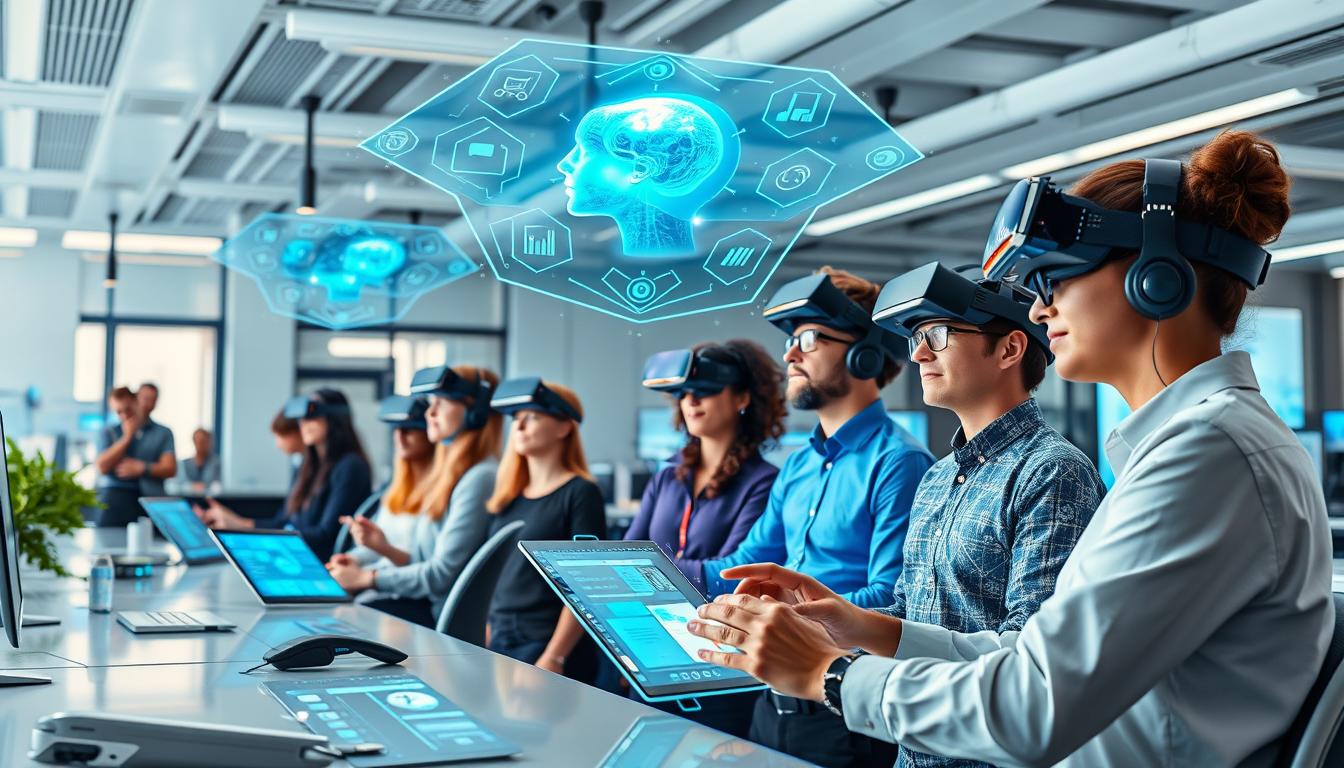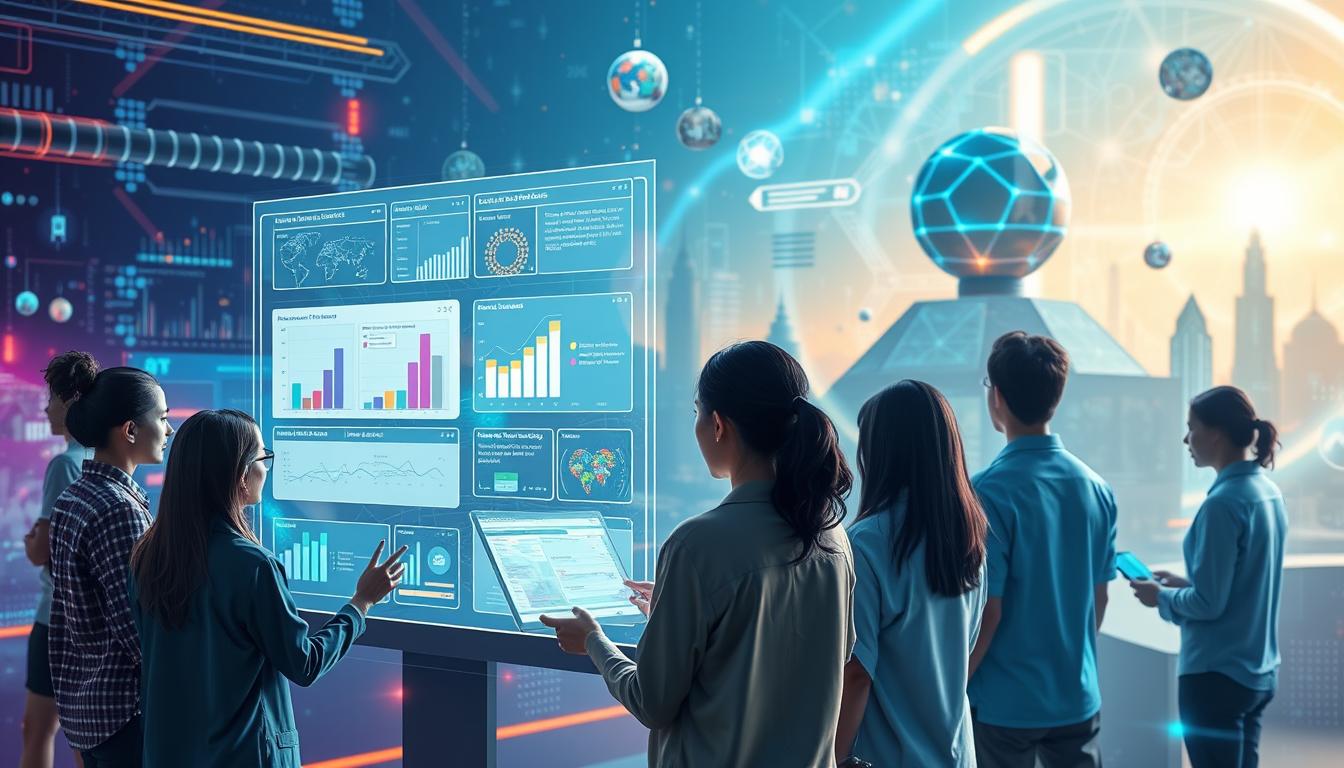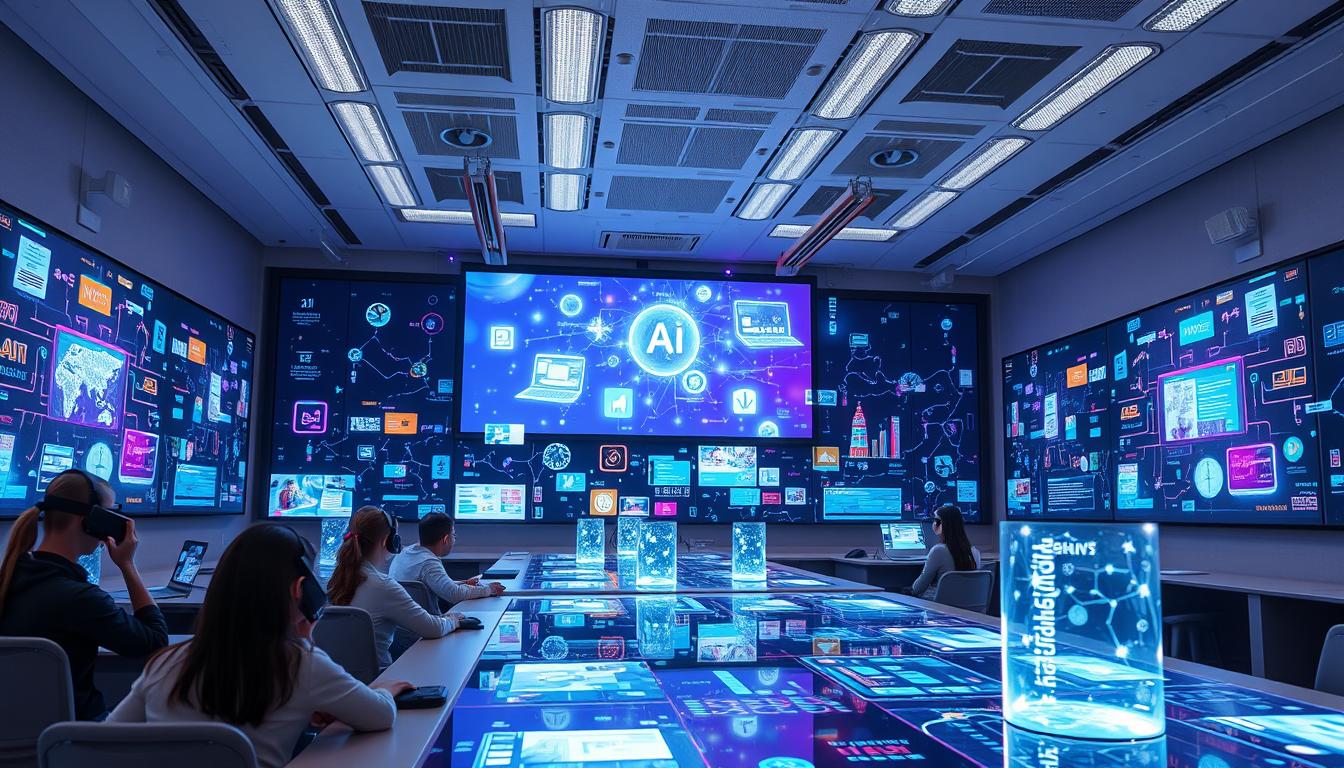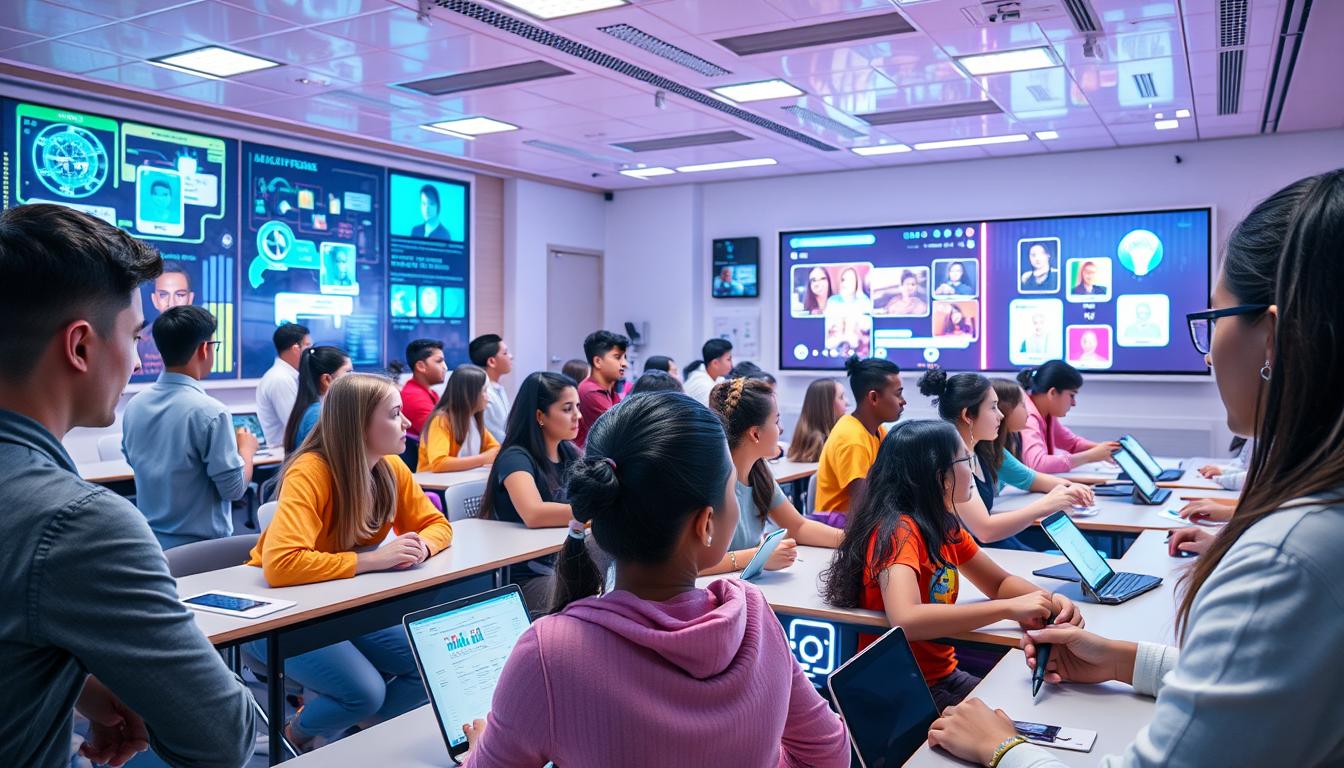In today’s fast-paced job market, upskilling is more crucial than ever. An IBM report forecasts that by 2026, about 1.4 billion people will need to reskill due to AI’s impact on various sectors. As companies aim to stay ahead, AI Learning Platforms are offering dynamic training solutions. These platforms focus on personalized learning, reshaping how businesses develop their workforce.
AI learning platforms use advanced technologies like machine learning and adaptive algorithms. They analyze data to create customized educational paths. By investing in AI training, organizations not only improve employee skills but also boost efficiency and satisfaction. This article explores the groundbreaking role of AI learning environments, discussing their advantages and challenges.
Key Takeaways
- AI Learning Platforms are essential for upskilling in the modern workforce.
- 1.4 billion individuals are projected to need reskilling due to AI advancements.
- Machine learning technologies enhance tailored training pathways.
- AI algorithms can identify skill gaps and improve employee performance.
- Modern platforms offer cost-effective training solutions compared to traditional methods.
The Rise of AI in Education
The integration of AI technology in education has sparked a remarkable evolution of learning environments. Traditional models are being transformed into dynamic platforms, allowing for personalized learning experiences that align with diverse learning preferences. As AI Learning Platforms gain traction, you’ll find that these systems not only facilitate engagement but also create opportunities for enhanced educational outcomes.
Transformative Impact on Learning Environments
AI’s presence in classrooms has reshaped how students and educators interact. In fact, research indicates that students with higher academic performance tend to leverage AI more than their peers. This trend highlights the importance of machine learning education in fostering student success. Educators are increasingly using AI tools, such as adaptive learning platforms and educational games, which help tailor lessons to meet individual needs. The Walton Family Foundation reports that both students and teachers advocate strongly for AI integration, recognizing its potential to modernize education effectively.
Technological Advancements Driving Change
Technological advancements play a pivotal role in elevating the educational landscape. With AI predicted to effectively automate up to 70% of current tasks carried out by employees, including educators, the pressure to adopt innovative tools has never been greater. Additionally, 75% of survey respondents believe that leveraging AI can significantly improve learner outcomes. Various companies and institutions are making strides in AI education, such as Google with their LearnLM models, designed to revolutionize personalized learning experiences. Initiatives like RAIL (Responsible AI in Learning) and AI Compass further demonstrate the commitment to ensuring ethical AI usage in education. As these advancements continue to unfold, embracing AI in the learning process is not just beneficial; it is essential for creating a future-ready educational framework.
Understanding AI Learning Platforms
AI Learning Platforms mark a significant change in education and training delivery. They use artificial intelligence to create powerful learning environments. These environments make learning more engaging and efficient. They adapt to each learner’s needs, enhancing their experience.
Definition and Core Features
At their heart, AI Learning Platforms aim to provide personalized education. Key features include:
- Personalized learning pathways: Programs that adjust based on the learner’s pace and preferences.
- Skill-based assessments: Evaluations that check learners’ abilities in real-time, ensuring they face suitable challenges.
- Adaptive learning capabilities: Systems that change content and teaching methods as learners progress through online AI courses.
Key Technologies Behind AI Learning Platforms
The success of AI Learning Platforms relies on several key technologies. These include:
- Natural Language Processing (NLP): This technology allows the platform to understand and respond to learner inquiries intuitively.
- Machine learning: Algorithms that analyze data to improve the learning experience, highlighting skill gaps and preferred learning styles.
- Automation: It streamlines administrative tasks, allowing more time for learners and instructors to focus on content.
Benefits of AI-Powered Learning Platforms
AI-powered learning platforms bring a unique edge to today’s education. They use advanced technology to meet individual needs, boost engagement, and enhance educational results. This results in a more effective and enjoyable learning journey.
Personalized Learning Experiences
AI Learning Platforms stand out for their personalized learning experiences. They adjust to each learner’s pace and style, ensuring content resonates with their needs. Features like customized lesson plans and tailored assessments provide support often missed by traditional methods. This approach strengthens the connection to the material and boosts retention rates.
Scalable Training Solutions for Organizations
Organizations looking for efficient training find scalable solutions in AI Learning Platforms. These platforms allow companies to reach a wide audience, overcoming geographical and logistical hurdles. Employees can learn from anywhere, making it easy to implement training without the costs of in-person sessions. This is especially helpful for large teams and growing organizations.
Cost-Effectiveness Compared to Traditional Methods
AI solutions offer a clear cost advantage over traditional training methods. AI Learning Platforms simplify administrative tasks, reducing the resources needed for training. They enable continuous updates with real-time data, keeping information current without extra costs. This not only cuts overhead but also improves the learning experience.

AI Learning Platforms and Employee Upskilling
AI learning platforms are crucial for employee upskilling, providing the necessary skills for a rapidly changing job market. Technologies evolve, and job roles transform significantly. In fact, 92% of jobs are expected to undergo high or moderate transformation due to advancements in AI. This highlights the need for organizations to invest in tailored training solutions.
Tailored Learning Pathways for Skill Development
These platforms excel in creating customized learning pathways that address the specific needs of your workforce. Advanced assessments help identify individual skill gaps and recommend relevant courses and materials. For instance, companies like IBM have shifted their hiring practices to prioritize relevant skills and certifications over traditional degrees, showcasing the impact of skills-focused training. Organizations like Google and Amazon are also making significant investments in employee upskilling, providing free training grants and committing to substantial funding respectively.
The Role of Continuous Learning in Career Growth
Continuous learning is essential for fostering career growth in this dynamic environment. Research indicates that 58% of employees anticipate their job skills will undergo substantial changes in the next five years due to AI and big data. Engaging in ongoing education allows workers to stay competitive and knowledgeable about new developments in their fields. Notably, 71% of participants in upskilling programs reported enhanced job satisfaction, along with an average predicted raise of $8,000 per year. Leveraging AI learning platforms not only enhances individual potential but also contributes to overall organizational growth and adaptability.

Assessing Skills Gap with AI
In today’s fast-paced business environment, assessing skills gaps is crucial for organizations aiming to stay competitive. With the transformative power of AI Learning Platforms, companies can effectively analyze skill deficiencies. They can align their workforce development with industry demands. A robust skills gap analysis can uncover learning needs that might otherwise go unnoticed.
Using Data to Identify Learning Needs
Data plays a pivotal role in identifying learning needs within an organization. By leveraging AI technologies, companies can collect and analyze performance metrics, employee feedback, and industry trends. This approach enables organizations to create a detailed picture of current competencies and pinpoint areas for improvement. Statistics indicate that:
- 57% of businesses have adopted AI for identifying employee skills gaps.
- 68% of employees express a willingness to retrain, regardless of circumstances.
- 76% of employees are more likely to stay with a company that offers continuous learning opportunities.
This data-driven method of skills gap analysis not only highlights immediate training needs. It also supports long-term workforce planning.
Analysis of Current and Future Skill Requirements
As workplaces evolve, understanding both current and future skill requirements becomes increasingly important. Executives estimate a significant percentage of their workers may need retraining or replacement in the near future. Research shows:
- 38% of workers will require fundamental retraining within three years.
- In a LinkedIn report, it’s noted that skill sets for jobs may transform by 50% by 2027.
AI Learning Platforms streamline the process of analyzing these shifting requirements. Organizations can efficiently forecast future skills needs, ensuring that training programs remain relevant. This adaptability becomes a strategic advantage in an ever-changing labor market.

Curating Learning Experiences with AI
AI Learning Platforms have transformed the way educational content is curated and delivered. They enhance the learning experience through advanced adaptive learning algorithms. These algorithms adjust to individual user pathways, ensuring each learner gets a personalized experience tailored to their unique needs.
Adaptive Learning Algorithms for Personalized Journeys
Adaptive learning algorithms are key in creating personalized learning experiences. They analyze learners’ behavior and assess their strengths and weaknesses. This enables the system to customize educational content dynamically.
Such algorithms quickly sift through vast datasets, identifying high-quality resources. They also predict emerging trends, ensuring content remains relevant and up-to-date.
Microlearning and its Benefits for Retention
Microlearning breaks down complex topics into short, focused segments. This approach significantly enhances knowledge retention. It allows employees to grasp essential skills and concepts without feeling overwhelmed.
By integrating microlearning into your training programs, you see improved engagement. Content becomes more digestible and easier to recall. These benefits show how AI Learning Platforms support microlearning strategies for better educational outcomes.
Top AI Learning Platforms on the Market
The educational landscape is rapidly evolving, with leading AI learning platforms at the forefront. These platforms offer robust features tailored for individual learners and support organizations in streamlining their training programs. Renowned names like Coursera, EdX, Docebo, and EdApp are among the best AI learning platforms available.

Overview of Leading Providers
When choosing an AI learning platform, it’s essential to evaluate the offerings from various providers. For instance:
- Docebo boasts a G2 rating of 4.4 out of 5 from 529 reviews, highlighting its user-friendly interface and effective performance.
- Absorb LMS received an impressive 4.7 out of 5 rating from 367 reviews, thanks to its Intelligence Assist tool, which simplifies administrative tasks.
- LearnUpon features an AI assessment tool utilizing OpenAI’s GPT API, with a G2 rating of 4.6 based on 129 reviews.
- EdApp boasts a 4.7 out of 5 rating from 215 reviews and includes an AI Create tool to help you design courses quickly.
- Cornerstone employs an innovative Skill Graph feature that automatically detects learner skills, ensuring customized learning pathways.
- 360Learning provides AI certification programs targeted at learning and development professionals, helping you stay competitive.
Features to Look for in a Learning Platform
When evaluating AI learning platforms, certain features stand out, enhancing the overall learning experience:
- Adaptive learning mechanisms that personalize education based on individual learning styles and preferences.
- User-friendly interfaces that simplify navigation and course management.
- Scalability to meet the demands of growing organizations while effectively training their workforce.
- Features like predictive analytics, which identify students needing extra support and tailor their learning paths.
- Integration of natural language processing (NLP) technologies for enhanced communication through chatbots and voice assistants.
Understanding these aspects will help you choose the right platform to meet your learning or organizational needs effectively. As AI learning platforms continue to advance, staying informed about trends is crucial for your lifelong learning journey. For further insight into the trends influencing upskilling, consider checking out this resource.
Challenges Faced by AI Learning Platforms
The introduction of AI Learning Platforms marks a significant shift in education. However, it comes with its own set of challenges. One major hurdle is the resistance to change within many organizations. Employees often struggle to adapt to new technologies. Thus, implementing effective change management strategies is crucial.
These strategies should aim to build trust and encourage user engagement. By directly addressing these concerns, organizations can pave the way for AI’s successful integration into their educational systems.
Overcoming Resistance to Change
To mitigate resistance, it’s essential to create a comfortable environment for technology adoption. Continuous professional development and training are key. They help bridge the skill gap, enabling educators and employees to fully utilize AI Learning Platforms.
Understanding AI is vital for overcoming educational challenges. Comprehensive training is necessary for successful navigation of these hurdles.
Addressing the Digital Divide in Access
The digital divide poses another significant challenge. It prevents many from accessing AI-powered learning solutions. Disparities in technology access hinder the full utilization of these tools. Therefore, investing in equitable training resources is vital.
Offering mobile-accessible content ensures all employees can participate in upskilling initiatives. For strategies to address these challenges and foster inclusivity, consider resources like AI in Business.
FAQ
What are AI learning platforms?
How do AI-powered learning platforms benefit organizations?
What key technologies are used in AI learning platforms?
How do personalized learning experiences work?
What is microlearning and why is it effective?
How can I assess my skills gaps using AI learning platforms?
What are some challenges faced by AI learning platforms?
Which are the best AI learning platforms available?
What role does continuous learning play in career growth?
Source Links
- Reskilling Reinvented: Top 10 AI-Powered Learning Platforms to Consider Today – https://360learning.com/blog/ai-learning-platforms/
- Upskilling And Reskilling The Workforce With AI-Powered Learning Platforms – https://elearningindustry.com/upskilling-and-reskilling-the-workforce-with-ai-powered-learning-platforms
- Council Post: The Rise Of AI-Enhanced Learning: Education For The Digital Age – https://www.forbes.com/councils/forbesbusinesscouncil/2024/02/13/the-rise-of-ai-enhanced-learning-education-for-the-digital-age/
- Artificial Intelligence In Education: Teachers’ Opinions On AI In The Classroom – https://www.forbes.com/advisor/education/it-and-tech/artificial-intelligence-in-school/
- The Rise of Artificial Intelligence and the Implications for School Districts – https://www.gettingsmart.com/2024/05/27/the-rise-of-artificial-intelligence-and-the-implications-for-school-districts/
- Definitive Guide to AI Platforms | Anaconda – https://www.anaconda.com/lp/definitive-guide-to-ai-platforms
- AI-Based Learning Platform: Examples, Features, and Top LMS on the Market – https://www.deel.com/blog/ai-based-lms/
- Learning With AI, Learning About AI – https://www.cde.ca.gov/ci/pl/aiincalifornia.asp
- AI in education: Use cases, solution and implementation – https://www.leewayhertz.com/ai-use-cases-in-education/
- 10 Top AI-Powered Learning Platforms (LMS) for 2024 – https://www.talentlms.com/blog/top-ai-learning-platforms/
- Friend or Foe? 3 Key Benefits of AI in Education for Students, Teachers, & Admins – https://www.viewsonic.com/library/education/friend-or-foe-3-key-benefits-of-ai-in-education-for-students-teachers-admins/
- AI-Powered Upskilling Platforms to Upskill Employees in 2025 – https://www.disco.co/blog/the-complete-guide-to-the-best-upskilling-platforms
- 10 Best AI learning platforms for efficient workplace learning | SC Training – https://training.safetyculture.com/blog/ai-learning-platform/
- How the Best Companies Are Using AI to Upskill Employees – https://www.greatplacetowork.com/resources/blog/how-the-best-companies-are-using-ai-to-upskill-employees
- The Widening Skills Gap and How AI Can Help Companies Keep Up – https://trainingindustry.com/articles/artificial-intelligence/the-widening-skills-gap-and-how-ai-can-help-companies-keep-up/
- How companies can use AI to find and close skills gaps | MIT Sloan – https://mitsloan.mit.edu/ideas-made-to-matter/how-companies-can-use-ai-to-find-and-close-skills-gaps
- Automating Skills Gap Analysis Using AI: 8 Steps to Consider – https://www.harbingergroup.com/blogs/how-to-automate-skills-gap-analysis-implementation-using-ai/
- AI’s Transformative Effect on Curating Digital Learning Content – https://www.digitallearninginstitute.com/blog/ai-transformative-effect-on-curating-content
- AI-Powered LMS Platform: How to Improve Learning with AI – https://www.docebo.com/learning-network/blog/ai-lms/
- Council Post: Next-Gen Education: 8 Strategies Leveraging AI In Learning Platforms – https://www.forbes.com/councils/forbestechcouncil/2024/06/04/next-gen-education-8-strategies-leveraging-ai-in-learning-platforms/
- 10 Top AI-Based Learning Platforms [With Real User Reviews] – https://www.docebo.com/learning-network/blog/ai-based-learning-platforms/
- Top-Rated AI-Powered Learning Platform for 2024: The Future Landscape of AI in E-Learning – https://www.disco.co/blog/top-rated-ai-powered-learning-platform
- Opportunities And Challenges Using AI In Personalized Online Education – https://elearningindustry.com/opportunities-and-challenges-using-ai-in-personalized-online-education
- National Coding Week – https://codingweek.org/the-benefits-and-challenges-ai-poses-to-education/


